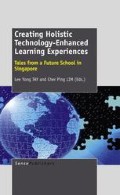Abstract
Early in the twentieth century, the pioneering education reformer and philosopher John Dewey (1934) advocated for a relevant experiential learning education system to motivate and engage students. Dewey wanted to enable children to make connections between what they learned in school and how they could live in society. He wanted to inculcate young people with social values that would encourage them to contribute to, and be a part of, the society in which they lived. He believed that the way to do this was to teach children to learn by doing, to be active participants in their education. Today Dewey’s philosophies are being widely advocated in our school systems.
Access this chapter
Tax calculation will be finalised at checkout
Purchases are for personal use only
Preview
Unable to display preview. Download preview PDF.
References
Ackroyd, J. (2000). Literacy alive! Drama projects for literacy learning. London: Hodder Murray.
Brown, V., & Pleydell, S. (1999). The dramatic difference: Drama in the preschool and kindergarten classroom. Portsmouth, NH: Heinemann.
Bull, G., & Kajder S. (2004). Digital storytelling in the language arts classroom. Learning and Leading with Technology, 32(4), 47–49.
Burgess, R., & Gaudry, P. (1985). Time for drama: A handbook for secondary teachers. Melbourne, Longman Cheshire.
Cahill, H. (2002). Teaching for community: Empowerment through drama. Melbourne Studies in Education, 43(2), 12–25.
Cussworth, R., & Simons, J. (2000). Beyond the script: Drama in the classroom. Sydney: Primary English Teaching Association.
Dewey, J. (1934). Art as experience. New York: Perigee Books.
Diamond, C. T. P, & Mullen, C. A. (1999). Stories of breakout: Academic gatekeepers, prisoners, and outlaws. In C. T. P. Diamond, & C. A. Mullen (Eds.), The postmodern educator: Arts based inquiries and teacher development (pp. 253–280). New York: Peter Lang.
Haseman, B., & O’Toole, J. (1987). Dramawise: An introduction to the elements of drama. Melbourne: Heinemann
Hull, G., & Nelson, M. (2005). Locating the semiotic power of multimodality. Written Communication, 22(2), 224–261.
Kao, S. M., & O’Neill, C. (1998). Words into worlds: Learning a second language through process drama. Stamford, CT: Ablex Publishing Corporation.
Jeanneret, N. (2009). Learning in the Arts. In C. Sinclair, N. Jeanneret, & J. O’Toole (Eds.), Education in the arts: Teaching and learning in the contemporary curriculum. South Melbourne: Oxford University Press.
McLellan, H. (Fall, 2006). Digital storytelling in higher education. Journal of Computing in Higher Education, 19(1), 65–79.
Merriam, S. B. (1998). Qualitative research and case study applications in education. San Francisco: Jossey-Bass.
O’Brien, A. (2003). Drama and community: Who the piper, whose the tune? NJ (Drama Australia Journal), 27, 5–16.
Oehler, J. (2008). Digital storytelling in the classroom: New media pathways to literacy, learning, and creativity. Thousand Oaks, CA: Corwin Press.
PERI. (March, 2009). Report of the Primary Education Review and Implementation (PERI) Committee. Singapore: Ministry of Education.
Polkinghorne, D. (1988). Narrative, knowing and the human sciences. New York: State University of New York Press.
Robin, B. R. (2008). Digital storytelling: A powerful technology for the 21st century classroom. Theory into Practice, 47(3), 220–228.
SERI. (December, 2010). Report of the Secondary Education Review and Implementation (SERI) Committee. Singapore: Ministry of Education.
Skinner, E. (2008). Developing literate identities with English language learners through digital storytelling. The Reading Matrix, 8(9), 12–38.
Stake, R. (1988). Case study methods in educational research: Seeking sweet water. In R. M. Jaeger (Ed.), Complementary methods for research in education, 2nd edition. Washington, DC: American Educational Research Association.
Stinson, M., & Freebody, K. (2006). The DOL Project: An investigation into the contribution of process drama to improved results in oral education. Youth Theatre Journal, 20, 27–41.
Taylor, P., & Warner, C. (2006). Introduction. In P. Taylor & C. Warner (Eds.), Structure and spontaneity: The process drama of Cecily O’Neill (pp. 1–31). Stoke-on-Trent: Trentham Books.
Winston, J., & Tandy, M. (1999). Beginning drama 4-1. London: David Fulton Publishers.
Winston, J. (1998). Drama, narrative and moral education. London: Falmer Press.
Winston, J. (2004). Drama and English at the heart of the primary curriculum. London: David Fulton.
Winston, J. (2012). Introduction. In J. Winston (Ed.), Second language learning through drama: Practical techniques and applications (pp. 1–6). Abingdon: Routledge.
Zipes, J. (2004). Speaking out: Storytelling and creative drama for children. New York: Routledge.
Author information
Authors and Affiliations
Editor information
Editors and Affiliations
Rights and permissions
Copyright information
© 2013 Sense Publishers
About this chapter
Cite this chapter
Wales, P.E., Mohamed, M. (2013). Digital Storytelling and Drama in the English Language Classroom. In: TAY, L.Y., LIM, C.P. (eds) Creating Holistic Technology-Enhanced Learning Experiences. SensePublishers, Rotterdam. https://doi.org/10.1007/978-94-6209-086-6_4
Download citation
DOI: https://doi.org/10.1007/978-94-6209-086-6_4
Publisher Name: SensePublishers, Rotterdam
Online ISBN: 978-94-6209-086-6
eBook Packages: Humanities, Social Sciences and LawEducation (R0)


